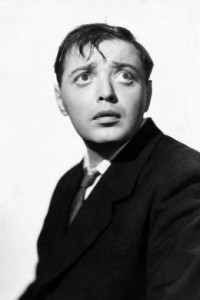 By Chris Benedict
By Chris Benedict
Laszlo Lowenstein was one of the great character actors of his time. Of any time. Odds are you know him better by his stage name Peter Lorre. Perhaps he is recognizable to you simply by his owlish eyes, large and sad and heavily-lidded, or his unusual and unmistakable and often imitated voice which calls to mind a chill wind cleaving through the still air of a moonlit cemetery at midnight. Lorre was a kind to a fault, compassionately caring man who suffered from the professional type-casting as screen heavy and boogeyman for whom horror, by default, became his bread and butter.
Born in Hungary, where he lost his mother Elvira at the tender age of four to blood poisoning, Lowenstein was uprooted to Vienna when he was fourteen and found a niche, against his father’s initial wishes, within a Freudian theatre group whose ambition was to stage productions which would exhibit in dramatic fashion the deepest, darkest, most twisted and detestable aspects of the human psyche. One early episode on the Austrian stage had Lorre acting out to disturbingly authentic effect an improvised experiment for director Zerka Moreno where he was instructed to confront a female cast mate, grab a prop knife from his jacket pocket, and chase her around the stage with homicidal intent. Several members of the audience, unsettled by the too-believable portrayal, leapt to their feet screaming “Murderer! Stop it! Stop it!”
Lowenstein’s artistic pursuits led him to the Bohemian utopia that was post-World War I Berlin. There, he officially changed his name to Peter Lorre and made the acquaintance of Bertolt Brecht whose theoretical teachings appealed immensely to Lorre’s introspective and intellectual nature. His inherent talent and tireless work ethic would earn Lorre a starring role in the latest masterpiece directed by Fritz Lang, the legendary German expressionist who already had Dr. Mabuse the Gambler, Die Nibelungen, Metropolis, and The Woman in the Moon under his directorial belt.
I don’t know or much care where M falls on AFI’s top movies. It should easily and firmly be entrenched within the top 5 for the rest of time. The grim story of a child murderer who is pursued by both the police force and the criminal underground and receives his comeuppance at the hands of a kangaroo court, M was Lang’s first sound film, the basis for which was Dusseldorf’s real-life serial killer Peter Kurten. Fritz’s only criticism of Lorre was that he failed to disclose the fact that he was unable to whistle, a vital oversight in that the presence of his character Hans Beckert is memorably preceded or menacingly implied by the whistling of Edvard Grieg’s In the Hall of the Mountain King. The actual off-key whistle in the movie is that of Fritz Lang.
British Master of Menace Alfred Hitchcock would seek Lorre’s services for third billing in The Man Who Knew Too Much. As he had with Lang, Lorre concealed a detrimental shortcoming from Hitch. Referring to himself later as “The man who didn’t know too much English”, Lorre’s limited command of the language forced him to allow Hitchcock to verbally dominate their interview then, after he was hired on, to learn and speak his lines phonetically, not unlike fellow Hungarian expatriate Bela Lugosi had for Dracula, both of their performances benefitting from a creepy gravitas with those halting and lurching utterances.
Contracted to Columbia Pictures, Lorre approached executives about developing and starring in an adaptation of his favorite novel, Dostoevsky’s Crime and Punishment. It was a wish that would be granted only under the condition that he first shave his head and consent to a loan out to MGM for Mad Love, a wonderfully macabre remake of the 1924 Conrad Veidt silent thriller The Hands of Orlac. Through no fault of his own, Crime and Punishment was a severe disappointment both at the box office and in trade paper reviews. Lorre’s Raskolnikov was a tormented soul as only Peter could breathe paranoid, deranged life into but Josef von Sternberg’s overall production of Dostoevsky’s intricately woven morality tale became entangled in its own good intentions and fell flat on its face.
The wildly popular Mr. Moto series would span eight films and bring Lorre wealth and acclaim but, with it, creative suffocation that threatened him artistically and physically. Having been treated with morphine, dilaudid, and pantopon following emergency gall bladder surgery in 1925, Lorre would increasingly partake in this cocktail of opiates to diminish his pain in its myriad manifestations. The dope would whisper sweet nothings into his ear while lowering his standards to doing B-pictures that he would contemptibly, but privately, refer to as “latrine duty”. His obligation to Mr. Moto also kept Lorre from accepting Universal’s offer to star in 1939’s Son of Frankenstein alongside Boris Karloff in his last turn as the monster and Bela Lugosi who played the broken-necked Ygor. The role of Baron von Frankenstein went instead to Basil Rathbone. Lorre would team up with Karloff and Lugosi a year later in the silly and forgettable comedic melodrama You’ll Find Out.
The Maltese Falcon offered Lorre not only his first substantial role in years but an introduction to two like-minded compatriots and partners in crime, Humphrey Bogart and Sydney Greenstreet. The timeless classic Casablanca, as well as Passage to Marseille and Beat the Devil, would all reunite the troika of Lorre, Bogey, and Sydney. Having fled Berlin as both an intellectual and a Jew during the ascension of Hitler’s National Socialist Party, Peter Lorre would return to finance, direct, and star in his passionate labor of love, 1951’s Der Verlorene (or, The Lost One), an uncompromising and morbidly ironic tale of Germany after the fall of the Third Reich. The original cut was lost to a warehouse fire and had to be painstakingly re-edited from the surviving master reels. Germans, not terribly keen on a fictional recreation of their horrific wartime experiences, particularly as viewed through the lens of a non-citizen, reacted with either apathy or open hostility. The movie, shelved for decades shortly after its premiere, was deemed a financial and critical disaster as well as a personal failure for Lorre who succumbed to a downward spiral of alcoholism and depression.
An ailing and prematurely aging Lorre was sadly reduced to taking whatever work he could get, as evidenced by his grudging appearances in such kid-oriented fare as 20,000 Leagues Under the Sea, Around the World in 80 Days, Big Circus, and Voyage to the Bottom of the Sea. Hollywood had become to him no more than “a place to make money and make faces”.
Roger Corman’s AIP (American International Pictures) established itself as a counterpart to Britain’s Hammer Films with severely loose renderings of revered source material from Edgar Allan Poe and Nathaniel Hawthorne, fantastic gothic settings, and buxom starlets who tested the integrity of the Victorian bodices they threatened to spill out of at any given moment. Lorre was grouped with Boris Karloff, Vincent Price, and Basil Rathbone in Comedy of Terrors as morticians who, when business begins to die down (if you pardon the pun), take matters in their own hands and create a clientele in the most unnatural and unethical of methods. Though looking worse for wear, Lorre was enjoying himself in a way that had eluded him since his days spent in the company of Bogart and Greenstreet. They returned, with a young Jack Nicholson, in the absurdly amusing The Raven, with the promise of more mirth and mayhem to come. Unfortunately, it was not to be. Signed by Corman to a two-picture deal for which scenarios were already drafted, Peter Lorre died of a heart attack at the age of 59 just four days after wrapping filming on The Patsy, a vehicle for the insufferable Jerry Lewis with whom Lorre detested working, complaining bitterly and openly about the experience in an unconventional display of bad behavior.
The victim of a fickle society which, even then, preferred and valued heroes who were beautiful yet disposable, not to mention his own excesses and eccentricities, Lorre was a flawed and conflicted human being. But, who among us is free from cracks showing through the façade?
Vincent Price recalled his fiendish friend as fun-loving, wistful, and lonely. Suspecting that Lorre was somewhat naïve about his abilities, Price lamented that he was an actor of far greater talent than the business would permit him to display. An original in a profession and, generally speaking, a world which manufactures and celebrates cheap copies.
[si-contact-form form=’3′]

 September 4th, 2015
September 4th, 2015  CEO
CEO  Posted in
Posted in  Tags:
Tags: 



